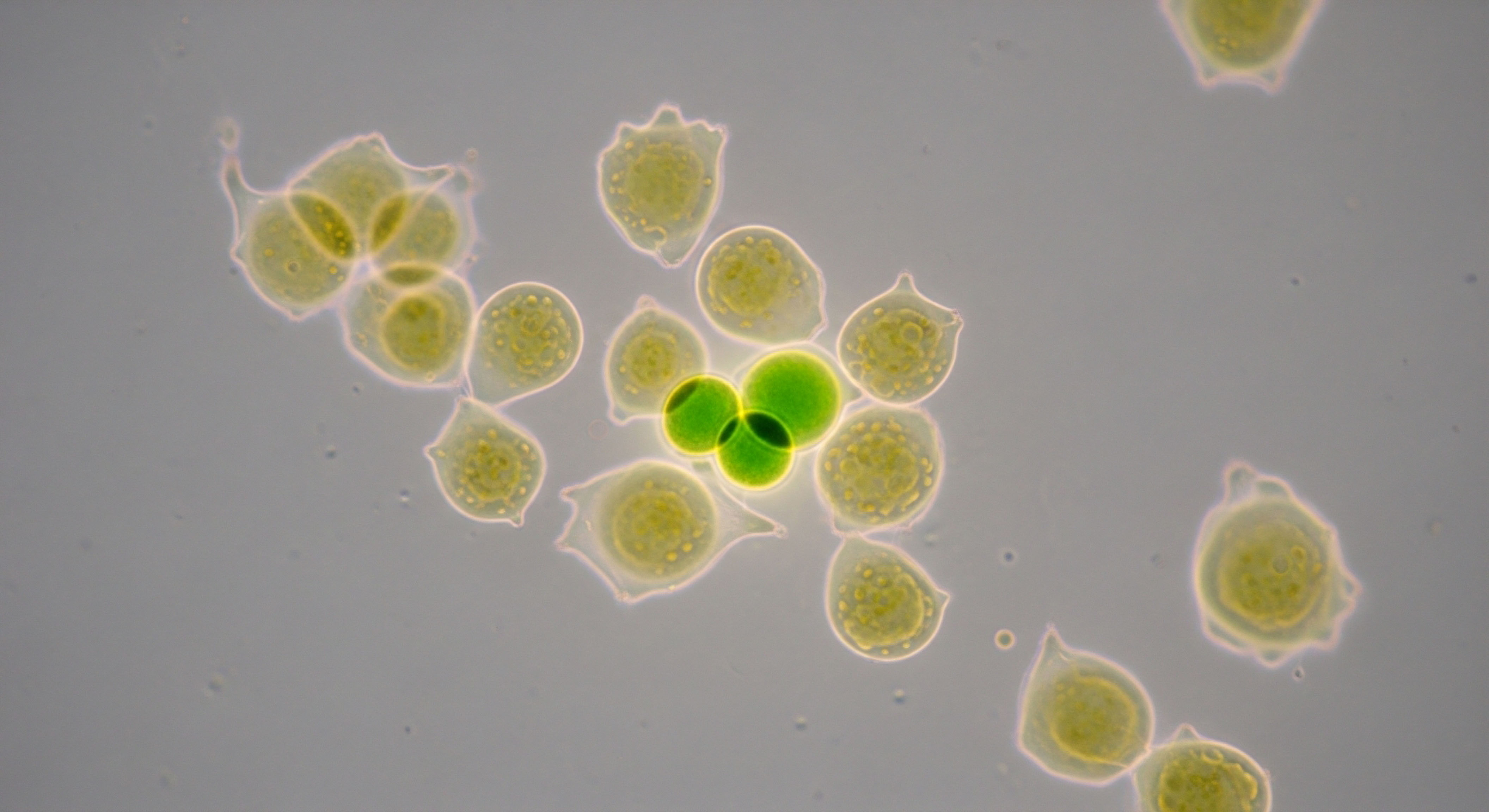

Why Master Your Biological Chemistry
The human body is a complex, dynamic system, a masterpiece of biological engineering designed for resilience and peak performance. For decades, its intricate chemical symphony orchestrates everything from cognitive acuity and physical power to metabolic efficiency and emotional equilibrium. Yet, as time progresses, this symphony can falter.
Natural declines in key hormones and shifts in metabolic pathways are not merely passive occurrences; they are active contributors to diminished vitality, accelerated aging, and increased susceptibility to chronic disease. Proactive mastery of your body’s chemistry is the fundamental strategy for not just extending lifespan, but profoundly enhancing healthspan ∞ ensuring your later decades are characterized by robust function, uncompromised vigor, and a sharp, engaged mind.

The Inevitable Shift in Hormonal Equilibrium
Hormones are the body’s primary communication network, dictating the rhythm of countless physiological processes. As individuals advance through their third and fourth decades, a natural and progressive decrease in the production of critical hormones begins. This decline impacts men and women distinctly, yet universally diminishes the body’s capacity for regeneration, energy production, and optimal function.

Testosterone and Estrogen ∞ Pillars of Vitality
For men, testosterone is central to muscle mass, bone density, libido, cognitive sharpness, and mood regulation. Its gradual reduction, often termed andropause, can manifest as fatigue, reduced physical capacity, increased body fat, and diminished mental drive. In women, estrogen and progesterone are critical for bone health, cardiovascular function, cognitive performance, and emotional stability. The hormonal shifts during perimenopause and menopause can lead to significant disruptions in these areas, impacting quality of life and long-term health outcomes.

Growth Hormone and IGF-1 ∞ The Regulators of Regeneration
Growth Hormone (GH) and its mediator, Insulin-like Growth Factor 1 (IGF-1), are paramount for cellular repair, tissue regeneration, and maintaining lean muscle mass. Secretion of GH typically peaks in young adulthood and declines significantly thereafter. This reduction directly correlates with decreased protein synthesis, impaired wound healing, and a less efficient metabolic rate, contributing to sarcopenia (muscle loss) and increased adiposity (fat accumulation).

Thyroid Hormones ∞ The Metabolic Engine
Thyroid hormones regulate the body’s metabolic rate, influencing energy production, body temperature, and the function of nearly every organ. Age-related changes can affect thyroid hormone production and receptor sensitivity, potentially leading to hypothyroidism, which exacerbates fatigue, weight gain, and cognitive sluggishness.
The gradual and progressive age-related decline in hormone production and action has a detrimental impact on human health by increasing risk for chronic disease and reducing life span.

Metabolic Health ∞ The Foundation of Longevity
Beyond hormonal cascades, metabolic health is a critical determinant of long-term vitality. Aging is frequently accompanied by diminished insulin sensitivity, impaired glucose metabolism, and altered body composition ∞ specifically, a reduction in lean muscle mass and an increase in visceral fat. These changes create a pro-inflammatory state, elevate the risk of type 2 diabetes, cardiovascular disease, and neurodegenerative conditions, and undermine the body’s ability to efficiently utilize energy.

The Biological Imperative for Proactive Optimization
Understanding these fundamental biological shifts reveals a clear imperative ∞ proactive intervention is not merely an option for enhancing well-being; it is the strategic pathway to future-proofing your body chemistry. By addressing hormonal imbalances and optimizing metabolic function, individuals can counteract age-related decline, enhance performance, and build a resilient biological foundation for decades of uncompromised vitality.


Engineering Your Endocrine Blueprint
Mastering your body’s chemistry involves a sophisticated, systems-based approach. It requires understanding the intricate mechanisms by which hormones and peptides function and strategically applying interventions to restore optimal signaling pathways. This is not about treating symptoms; it is about recalibrating the core biological machinery that governs vitality, performance, and longevity.

Hormone Optimization Protocols
The cornerstone of future-proofing body chemistry lies in restoring hormone levels to their optimal physiological ranges, often mirroring those found in peak health during younger years. This involves precise assessment and tailored therapeutic strategies.

Testosterone Replacement Therapy (TRT)
For men experiencing hypogonadism or age-related testosterone decline, TRT is a potent intervention. Administered via injections, gels, or patches, it directly supplements testosterone, restoring levels to support muscle mass, strength, cognitive function, libido, and overall energy. It is crucial that TRT is managed by a qualified practitioner who monitors levels and potential side effects, ensuring it is recognized as a therapeutic tool for healthspan enhancement, not merely a performance enhancer.

Estrogen and Progesterone Modulation
In women, managing declining estrogen and progesterone levels through Bioidentical Hormone Replacement Therapy (BHRT) is essential. BHRT utilizes hormones that are chemically identical to those produced by the body, offering a more nuanced approach to alleviate menopausal symptoms, protect bone density, support cardiovascular health, and maintain cognitive function.

Growth Hormone Secretagogues and Peptide Therapies
Peptides, short chains of amino acids, act as precise signaling molecules that can influence cellular behavior. Therapies employing Growth Hormone Releasing Peptides (GHRPs) such as Sermorelin, Ipamorelin, and CJC-1295, stimulate the pituitary gland to release more GH naturally. This process can lead to improved body composition, enhanced cellular repair, better sleep quality, and increased energy levels.
Other peptides, like GHK-Cu (Copper Peptide), are vital for collagen synthesis, skin rejuvenation, and wound healing, directly combating visible signs of aging and supporting tissue integrity. Epitalon, a synthetic peptide, has shown potential in activating telomerase, which may lengthen telomeres, a key marker associated with cellular youth and longevity.
Peptides are short chains of amino acids ∞ typically fewer than 50 ∞ linked together by peptide bonds. They act as signaling molecules in the body, telling cells what to do, when to do it, and how intensely.

Metabolic Recalibration Strategies
Optimizing metabolic health is intrinsically linked to hormonal balance and overall longevity. This involves strategies that enhance insulin sensitivity, improve mitochondrial function, and manage body composition.

Nutrient Partitioning and Mitochondrial Support
A diet rich in whole foods, healthy fats, lean proteins, and fiber supports hormonal production and stable energy levels. Specific nutrients and compounds can bolster mitochondrial function, the cellular powerhouses responsible for energy generation. Improving insulin sensitivity through diet and exercise allows the body to more effectively utilize glucose, reducing the risk of metabolic dysfunction.

Body Composition Management
Maintaining lean muscle mass through resistance training is critical. Muscle tissue is metabolically active and plays a significant role in glucose uptake and hormonal regulation. Conversely, excessive body fat, particularly visceral fat, is associated with chronic inflammation and hormonal dysregulation. Strategic interventions aim to increase lean mass and reduce adipose tissue, thereby recalibrating metabolic efficiency.

The Interconnectedness of Systems
It is imperative to recognize that these systems ∞ endocrine, metabolic, and cellular ∞ are not isolated. Hormonal imbalances can directly impact metabolic health, and poor metabolic function can, in turn, disrupt endocrine signaling. A holistic approach that addresses all these interconnected elements provides the most robust pathway to sustained vitality.
Key strategies include:
- Comprehensive baseline bloodwork to assess hormone levels (testosterone, estrogen, progesterone, DHEA-S, thyroid panel, GH/IGF-1 markers), metabolic markers (glucose, insulin, HbA1c, lipid profile), and inflammatory markers.
- Personalized hormone replacement or modulation protocols based on individual needs and clinical goals.
- Targeted peptide therapies to stimulate natural hormone release, enhance cellular repair, and improve tissue regeneration.
- Nutritional programming that prioritizes whole foods, healthy fats, adequate protein, and fiber to support hormonal synthesis and metabolic function.
- A structured resistance training regimen to build and maintain lean muscle mass, crucial for metabolic health and functional strength.
- Stress management techniques and optimized sleep hygiene to regulate cortisol levels and support overall endocrine balance.


The Strategic Cadence of Optimization
The journey to future-proof your body chemistry is a continuous, evolving process, not a singular event. It demands a strategic cadence, beginning with foundational understanding and progressing to precise, evidence-based interventions timed for maximum efficacy and safety.

Establishing Your Biological Baseline
The critical first step is comprehensive diagnostic assessment. This involves detailed bloodwork to precisely measure your current hormonal profiles, metabolic markers, inflammatory status, and key nutrient levels. Understanding your unique endocrine and metabolic landscape provides the essential data to inform any subsequent optimization strategy. This baseline establishes your starting point, allowing for personalized protocols that align with your individual physiology rather than generic recommendations.

Lifestyle as the Unwavering Foundation
Before considering advanced interventions, a robust lifestyle framework is non-negotiable. This includes ∞
- Consistent, high-quality sleep (7-9 hours per night)
- A nutrient-dense, whole-foods-based diet tailored to your metabolic needs
- Regular, varied exercise, incorporating both resistance training and cardiovascular conditioning
- Effective stress management practices
These elements are the bedrock upon which all other optimization strategies are built. Neglecting them significantly limits the potential efficacy and safety of any hormonal or peptide intervention.

Timing and Application of Interventions
The “when” of implementing specific therapies is dictated by individual assessment, age, and specific health and performance goals. It is a phased approach, prioritizing safety and efficacy.

Early Intervention and Prevention
For many, subtle hormonal shifts begin in the late 20s and early 30s. Identifying and addressing these early declines can prevent the cascading negative effects that manifest later. This might involve lifestyle adjustments or very early, conservative hormonal support if clinically indicated.

Strategic Hormone Replacement and Peptide Therapies
For individuals with clinically diagnosed deficiencies or those seeking to optimize function beyond average age-related decline, hormone optimization and peptide therapies are introduced. This typically occurs once lifestyle foundations are firmly established and baselining is complete. The timing is determined by the severity of the imbalance, the individual’s response to lifestyle modifications, and their specific goals for vitality, performance, and longevity.
For instance, addressing declining GH/IGF-1 might be considered in the 40s and beyond to counteract sarcopenia and support tissue repair. Testosterone optimization may be initiated when levels fall below optimal ranges, impacting quality of life and physical capacity.

Ongoing Monitoring and Adjustment
The endocrine system is dynamic. Protocols are not static. Regular monitoring of hormone levels, metabolic markers, and subjective well-being is essential. Adjustments to dosages, types of therapies, or lifestyle strategies are made based on these ongoing assessments, ensuring continued efficacy and safety over time. This adaptive approach allows for a lifelong strategy of biological mastery.

Architecting Decades of Uncompromised Vitality
The future of human performance and longevity is not a passive surrender to biological entropy; it is an active, intelligent engineering of our internal biological landscape. By understanding the profound influence of hormonal equilibrium and metabolic efficiency, and by applying precise, science-backed interventions, we transcend the narrative of inevitable decline.
This is the domain of the Vitality Architect ∞ mastering the chemistry of life to unlock sustained peak performance, cognitive sharpness, and an unyielding sense of well-being, not just for years, but for decades to come. This proactive approach is the ultimate statement of control over one’s biological destiny.

Glossary

biological engineering

healthspan

vitality

estrogen and progesterone

testosterone

lean muscle mass

growth hormone

metabolic health

body composition

age-related decline

muscle mass

estrogen

lean muscle

peptide therapies




